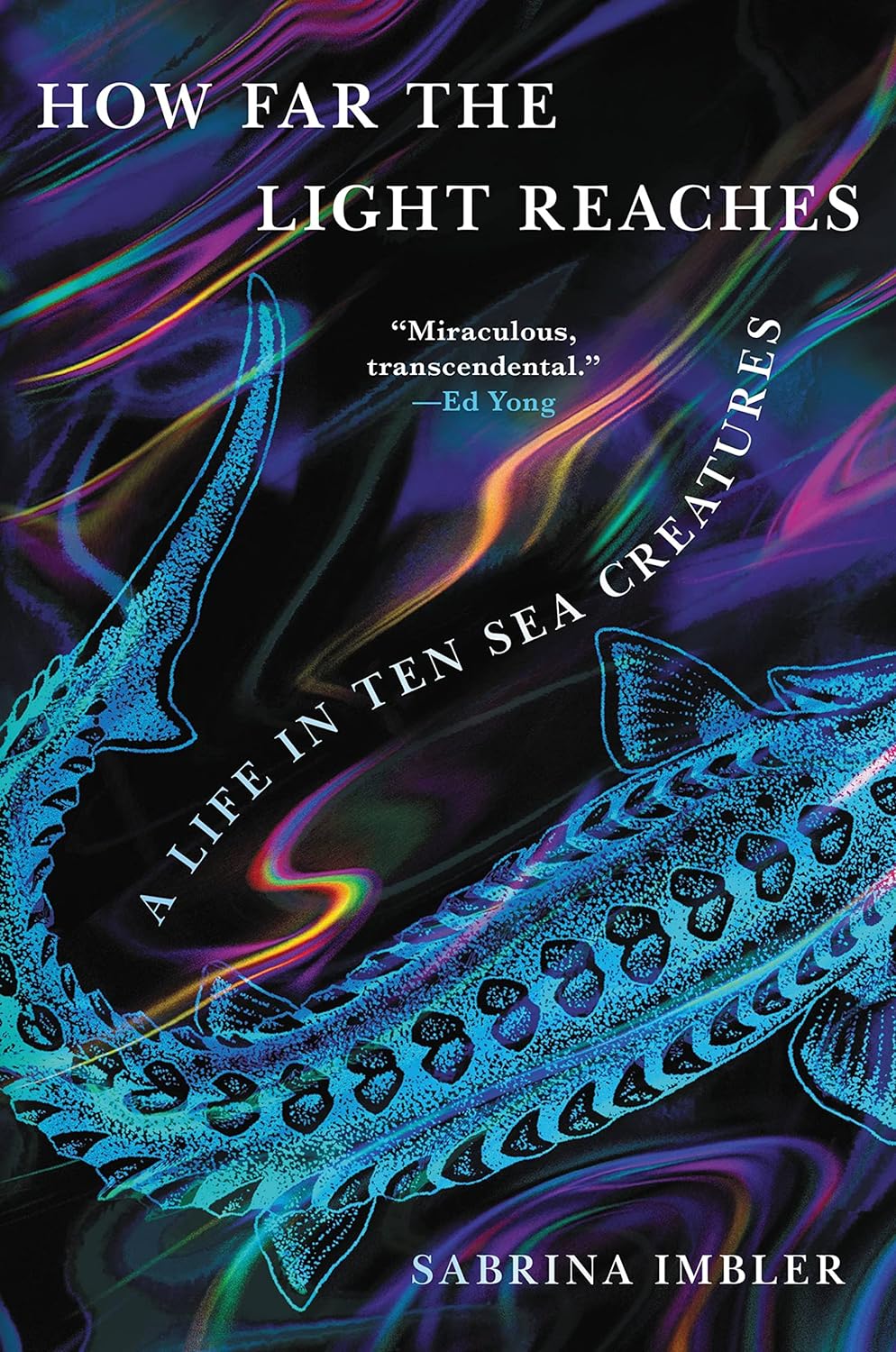Review of How Far the Light Reaches: A Life in Ten Sea Creatures by Sabrina Imbler

How Far the Light Reaches: A Life in Ten Sea Creatures
Sabrina Imbler
Hachette Book Group, Back Bay Books, 2024, 288 pages
$21.99
Reviewed by Dot Persica
I was in Brooklyn waiting for an audition when I stepped into Greenlight Bookstore to pass the time. How Far the Light Reaches immediately seized my attention. I didn’t know it would be a Queer book when I picked it up; I was just captivated by the cover illustrated by Simon Ban. I can’t help but think it’s no coincidence Queer people keep finding each other in the midst of the world’s attempts to isolate us. Something at my fingertips must have known before I did why, once I picked up this book, I could not part with it.
How Far the Light Reaches has everything. Imbler takes us on a journey of self-discovery by connecting ten sea creatures with peculiar characteristics to events in the author’s life: they dive into their relationship with their mother and disordered eating through the story of the octopus mother who starves in order to protect her eggs; they travel back to their grandmother’s youth guided by the Chinese sturgeon; they look deep into their present and future, exploring what it means to be different and to be part of a whole through creatures like hybrids and salps. Imbler’s experiences with sex, race—specifically being biracial and Asian in America—their gender nonconformity and the constant discovery of who they have been and who they are becoming are explored alongside each creature, connected seamlessly. The isolation of being racialized in a predominantly white context, the overwhelming joy of discovering spaces in which they are no longer the minority, the pain and the solace found in being who they are, navigating the aftermath of sexual assault, finding love and losing it and finding it elsewhere, everywhere—are all experiences that coexist and overlap. They cannot be separated but are dissected in this book like little animals, part of Imbler’s quest for answers.
This is the strange and beautiful, perfectly crafted child of the memoir and the encyclopedia.
As I was reading, I felt as though I was shifting from egg to larva to juvenile to adult, like one of the creatures described by the author: I was part of their delightful, excruciating, rewarding journey of growing up, and I felt as though I was going through all those changes myself in a strange time loop of my own making, pausing whenever I was forced by the outside world to look up from the book, and resuming my metamorphosis as soon as my eyes returned to the page.
Imbler digs to the root of painful topics in a gentle way. Their retelling of their trauma is for those who understand it: it’s an embrace rather than a slap; it doesn’t seek to spark compassion in the disinterested perpetrators. Imbler’s vulnerability is for those who have had similar experiences. In doing so, they hold not only their readers but also their own younger self (all their selves) in an embrace that lasts until the final page of this book, past the acknowledgements, and up to the last citation, maybe longer. This is a love letter to Queer people, an ode to the perpetual survival of marginalized communities against all odds.
I got through this book in two days because I am an autistic lesbian who wants to know the secrets of the ocean but was too bad at science to try to go into marine biology, but it would have been hard to put down regardless. The creatures chosen by Imbler for this personal and poetic work span from ordinary to almost mythical; we learn about the incredible adaptability of the goldfish and the surreal habitat of the yeti crab, living in conditions we consider absurd. Queerness is defying expectation, making it through, the same way nobody teaches ontogeny reversal to the immortal jellyfish, but somehow they know how to do it. Making sense of your existence on your own terms in a world that wants you docile and compliant because you are a “woman,” because you are Asian, is defying expectations. Loving someone who is like you when you are consistently told that the way you are is wrong: defying expectations. With each creature, the concepts of “natural” and “unnatural” are redefined—each creature is a key unlocking a facet of the human experience; each human experience is transposed into something greater, a whole that we are all part of.
How Far the Light Reaches is a window into each other, which means ourselves, through Imbler’s work. What a gift.
Dot Persica (any pronouns) is a lesbian performer born in Naples, Italy. They are a classically trained soprano with a vague dance background; they have experience directing opera, helping out here and there on film sets, and doing stand-up. They are a co-founder of the Italian lesbian+ collective STRASAFFICA*, with which they have organized community events, raised funds, and created beautiful bonds. They also write poetry, like all lesbians.
"Empowerment comes from ideas."
― Charlene Carruthers
"Your silence will not protect you."
— Tourmaline
"Gender is the poetry each of us makes out of the language we are taught."
— Leila Raven


